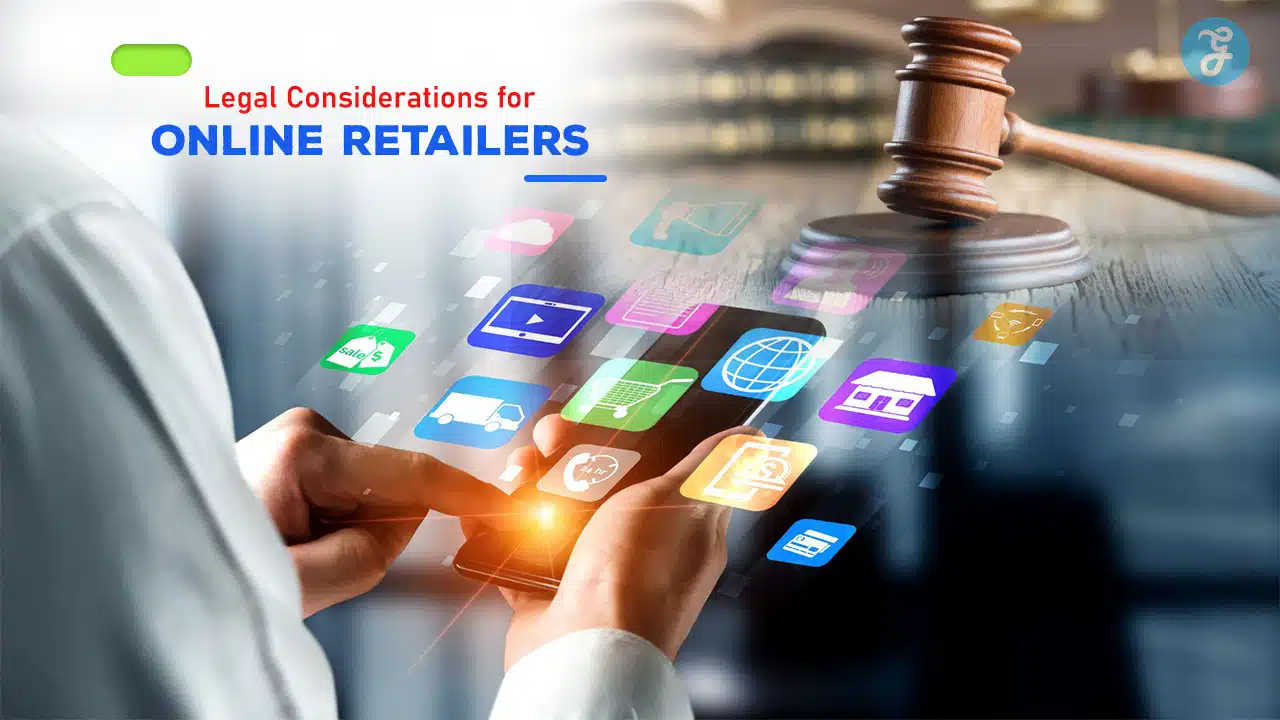As the eCommerce industry continues to expand globally, online retailers are tapping into a vast pool of consumers.
However, operating an online store comes with its own set of legal obligations and risks.
Failure to comply with these regulations can result in hefty fines, legal disputes, and damage to your business reputation.
To ensure your online store runs smoothly and stays on the right side of the law, it’s crucial to understand the legal landscape and implement best practices.
Here are 12 detailed legal considerations for online retailers to help navigate the complexities of eCommerce law and safeguard their business.
1. Business Registration and Licensing
Why It’s Important:
Before launching your online store, you must ensure your business is legally recognized in the jurisdiction where you operate.
Whether you’re a solo entrepreneur or managing a larger enterprise, registering your business correctly is essential for compliance with local laws and tax regulations.
You may also need specific licenses depending on the products you sell or the regions you operate in.
Key Points to Consider:
- Business Structure:
Choosing the correct business structure—such as sole proprietorship, limited liability company (LLC), or corporation—can affect your liability, taxes, and legal obligations.
For example, an LLC offers limited liability protection, which means your personal assets are protected if your business is sued.
- Licenses and Permits:
Depending on your location and product types, you may need additional permits.
For example, if you’re selling food, alcohol, or healthcare products, special licenses might be required.
Practical Steps:
- Register your business with local authorities and obtain an Employer Identification Number (EIN) for tax purposes.
- Verify the specific licenses needed for the products you sell or the services you provide.
Consequences of Non-Compliance:
Failure to register your business or obtain the necessary licenses can result in fines, penalties, or even forced closure.
In some cases, personal assets may be at risk if you operate without a proper business structure.
2. Terms and Conditions Agreement
Why It’s Important:
Your Terms and Conditions (T&C) agreement establishes the rules for using your website, purchasing products, and how disputes will be handled.
This legal document helps protect your online store by defining the relationship between you and your customers, including limitations on your liability.
Key Points to Consider:
- Limitation of Liability:
Specify that your liability is limited for issues such as product defects, service delays, or website outages. This clause helps protect you from unreasonable claims.
- Dispute Resolution:
Outline how disputes will be resolved—whether through arbitration, mediation, or litigation—and specify the governing law.
- User Conduct:
Define acceptable behavior for users on your website, such as prohibiting fraudulent activities or misuse of your platform.
Practical Steps:
- Have a legal professional draft or review your T&C to ensure it aligns with your business model and protects your interests.
- Make the T&C easily accessible on your website and ensure that customers agree to it before completing any transactions.
Consequences of Non-Compliance:
Without clear and enforceable terms, your business could be exposed to unnecessary legal risks, such as unfounded claims from customers, data misuse, or disputes over product returns.
3. Privacy Policy and Data Protection Compliance
Why It’s Important:
Online retailers handle sensitive customer information, such as names, addresses, payment details, and browsing habits.
A Privacy Policy is a legal requirement in many regions, outlining how you collect, use, store, and protect customer data.
Compliance with laws like the General Data Protection Regulation (GDPR) in Europe and the California Consumer Privacy Act (CCPA) in the U.S. is crucial for avoiding hefty fines and legal action.
Key Points to Consider:
- Data Collection:
Your policy should disclose what personal data is collected from users, including cookies, IP addresses, and any other tracking information.
- Third-Party Sharing:
Specify whether you share user data with third parties for marketing or data processing purposes.
- User Rights:
Make sure to explain how users can access, update, or delete their data, especially if you are operating in jurisdictions with stringent data protection laws like the EU or California.
Practical Steps:
- Draft a privacy policy that clearly explains your data collection practices and complies with relevant data protection laws.
- Implement consent mechanisms (such as cookie banners) to ensure that users actively agree to how their data will be used.
Consequences of Non-Compliance:
Non-compliance with privacy laws like GDPR and CCPA can result in significant fines—up to €20 million or 4% of your global turnover for GDPR violations.
Additionally, mishandling personal data can lead to reputational damage and customer distrust.
4. Intellectual Property Protection (Copyright, Trademarks, and Patents)
Why It’s Important:
Intellectual property (IP) is a key asset for online retailers.
Your brand’s name, logo, product designs, and content all need to be protected from infringement.
At the same time, you must avoid infringing on the intellectual property rights of others, as doing so could lead to costly legal disputes.
Key Points to Consider:
- Trademarks:
Register your business name, logo, and any unique product names with the relevant trademark office to prevent others from using them.
- Copyrights:
Ensure the content on your website—such as text, images, and product descriptions—either belongs to you or is licensed for use.
- Patents:
If you’re selling unique, innovative products, consider obtaining patents to protect your designs or inventions.
Practical Steps:
- Conduct a trademark search before naming your business or products to ensure that the names aren’t already in use.
- Monitor your competitors and the marketplace to detect potential infringements of your IP.
- Use watermarks or other methods to protect original images and content from unauthorized use.
Consequences of Non-Compliance:
Infringing on someone else’s intellectual property can result in lawsuits, damages, and cease-and-desist orders.
Additionally, failing to protect your own IP can lead to competitors copying your products, diminishing your brand value.
5. Sales Tax Compliance
Why It’s Important:
Sales tax laws for eCommerce businesses can be complex and vary depending on where your customers are located.
In the U.S., different states have different sales tax requirements, and internationally, you may need to comply with value-added tax (VAT) or goods and services tax (GST) regulations.
Key Points to Consider:
- Nexus Rules:
You may be required to collect sales tax in states where your business has a nexus (a physical presence or significant economic activity).
Even if you’re based in one state, selling to customers in other states or countries might create tax obligations.
- International Sales:
If you’re selling to customers outside of your country, you may be required to collect and remit VAT or GST, depending on local laws.
Practical Steps:
- Use sales tax software or consult with an accountant to ensure that you correctly apply sales tax to customer purchases based on their location.
- Regularly review state and local tax regulations to stay compliant as your business grows and your sales territories expand.
Consequences of Non-Compliance:
Failure to comply with sales tax regulations can lead to audits, penalties, and back taxes.
It’s essential to stay on top of your obligations, as these rules are frequently updated.
6. Shipping Laws and Regulations
Why It’s Important:
Shipping laws govern how goods are transported, especially when crossing international borders.
As an online retailer, you need to be aware of any restrictions on shipping certain types of products and the applicable customs duties or taxes for international sales.
Key Points to Consider:
- Shipping Restrictions:
Certain goods, such as alcohol, firearms, or hazardous materials, may have specific shipping restrictions or requirements.
- Customs Duties:
If you’re shipping internationally, customs duties may apply.
Clearly communicate whether the customer or the retailer is responsible for these fees.
- Shipping Timelines:
Be transparent with your customers about expected delivery times and ensure that these timelines are reasonable and achievable.
Practical Steps:
- Work with a reliable shipping provider to understand the specific regulations for shipping your products domestically and internationally.
- Provide customers with tracking information and a clear understanding of shipping costs and duties before they complete their purchase.
Consequences of Non-Compliance:
Failing to comply with shipping laws can result in delayed or seized shipments, fines, and unhappy customers.
Clear communication about shipping timelines and duties is essential to avoid disputes.
7. PCI DSS Compliance (Payment Security Standards)
Why It’s Important:
Handling credit card payments comes with strict security requirements.
The Payment Card Industry Data Security Standard (PCI DSS) outlines mandatory security measures for any business processing credit card transactions.
These standards help protect customer data and prevent fraud.
Key Points to Consider:
- Data Encryption:
Ensure all payment information is encrypted to protect against hacking or data breaches.
- Tokenization:
Consider using tokenization, which replaces sensitive card data with unique identifiers (tokens), reducing the risk of exposure during transactions.
- Payment Processor:
Use a PCI DSS-compliant payment gateway to process credit card payments securely.
Practical Steps:
- Work with a reputable, PCI-compliant payment processor to handle sensitive payment data.
- Regularly review your security measures and update them as needed to comply with evolving PCI standards.
Consequences of Non-Compliance:
A failure to comply with PCI DSS can result in security breaches, leading to hefty fines, increased transaction fees, and loss of customer trust.
You could also be held liable for any fraudulent transactions that occur as a result of inadequate security measures.
8. Consumer Protection Laws
Why It’s Important:
Consumer protection laws are designed to ensure fair business practices, and they apply just as much to online retailers as they do to brick-and-mortar stores.
These laws govern issues like refunds, returns, warranties, and the accuracy of advertising.
Key Points to Consider:
- Refund and Return Policies:
Make sure your refund and return policies comply with local consumer protection laws.
In some countries, customers have a legal right to return goods within a specific period.
- Product Warranties:
If your products come with warranties, ensure the details are clear and in compliance with local regulations.
- Advertising and Pricing:
Avoid misleading or deceptive advertising. All product descriptions and pricing information must be accurate.
Practical Steps:
- Include a clear, legally compliant return policy on your website. Make it easy for customers to understand how they can return products if necessary.
- Review your product descriptions regularly to ensure they accurately reflect the products you’re selling.
Consequences of Non-Compliance:
Failure to comply with consumer protection laws can lead to fines, lawsuits, and damage to your business’s reputation.
Clear and transparent communication with your customers can help avoid disputes.
9. ADA Compliance (Website Accessibility)
Why It’s Important:
The Americans with Disabilities Act (ADA) requires businesses to make their services accessible to individuals with disabilities.
This includes online retailers, as websites are considered public accommodations.
Ensuring your site is accessible not only helps you avoid legal issues but also makes your online store available to a broader audience.
Key Points to Consider:
- Accessibility Standards:
Follow the Web Content Accessibility Guidelines (WCAG) 2.1 to ensure your website is accessible to people with visual, auditory, or physical disabilities.
This includes providing text alternatives for images, offering keyboard navigation, and ensuring content is easily readable by screen readers.
- Usability Testing:
Regularly test your website for accessibility to identify and fix issues that may prevent disabled users from fully accessing your content.
Practical Steps:
- Work with a web developer to implement accessibility features like alt text for images, captions for videos, and keyboard-friendly navigation.
- Conduct an accessibility audit to identify areas of your website that may need improvement.
Consequences of Non-Compliance:
Non-compliance with ADA can result in lawsuits, fines, and loss of customer trust.
Making your site accessible not only helps you meet legal requirements but also expands your customer base by accommodating people with disabilities.
10. GDPR and CCPA Compliance
Why It’s Important:
The General Data Protection Regulation (GDPR) and the California Consumer Privacy Act (CCPA) are landmark data protection laws that affect businesses operating globally.
GDPR applies to businesses that collect data from EU citizens, while CCPA protects California residents.
Both laws give consumers greater control over their personal data, and failure to comply can result in significant penalties.
Key Points to Consider:
- Consent for Data Collection:
Both GDPR and CCPA require that users give explicit consent before you collect their data.
This applies especially to sensitive information or for marketing purposes.
- Data Transparency:
Inform customers about the types of data you collect, how you use it, and their rights to access or delete their data.
- Data Breach Notification:
If a data breach occurs, both GDPR and CCPA require you to notify affected users within a specific timeframe.
Practical Steps:
- Implement a consent mechanism, such as a cookie banner, to ensure compliance with GDPR and CCPA’s data collection requirements.
- Maintain a data protection policy and ensure all employees handling customer data are trained in GDPR and CCPA compliance.
Consequences of Non-Compliance:
Under GDPR, fines can reach up to €20 million or 4% of your global turnover, while CCPA violations can lead to fines of up to $7,500 per violation.
Non-compliance can also damage your business’s reputation and lead to legal disputes.
11. Product Liability and Safety Laws
Why It’s Important:
If you sell physical products, you are responsible for ensuring that they are safe for consumer use.
Product liability laws hold retailers accountable for injuries or damages caused by defective or unsafe products.
This includes online retailers, especially if they are selling items like electronics, food, or cosmetics.
Key Points to Consider:
- Product Testing and Certification:
Ensure that your products meet safety standards and certifications required by law.
This is especially important for products like electronics, children’s toys, or health-related items.
- Labeling Requirements:
Products may need to include specific labeling to inform consumers of risks, ingredients, or proper use.
- Recalls:
In the event that a product is found to be dangerous, you may need to issue a recall and notify customers about the safety risks.
Practical Steps:
- Implement strict quality control processes to minimize the risk of defective products being sold.
- Ensure all products are labeled according to relevant safety standards and that customers are informed about proper usage.
Consequences of Non-Compliance:
Product liability lawsuits can result in significant financial losses, as well as damage to your brand reputation. Unsafe products can also lead to mandatory recalls and regulatory fines.
12. Influencer and Affiliate Marketing Disclosures
Why It’s Important:
If you engage in influencer marketing or run an affiliate program, transparency is essential.
The Federal Trade Commission (FTC) in the U.S., as well as other global regulators, require that businesses and their affiliates or influencers clearly disclose paid endorsements.
This helps consumers make informed purchasing decisions and builds trust in your brand.
Key Points to Consider:
- Clear Disclosure:
Ensure that influencers and affiliates clearly state when they are being compensated for promoting your products.
Use hashtags like #ad or #sponsored to disclose paid partnerships.
- Affiliate Links:
Inform users when an affiliate link is used on your website or by third-party promoters.
Practical Steps:
- Develop clear guidelines for influencers and affiliates regarding how to disclose paid endorsements.
- Review influencer and affiliate content to ensure compliance with disclosure rules.
Consequences of Non-Compliance:
Failure to disclose paid endorsements can result in FTC fines, lawsuits, and reputational damage.
Transparency in advertising is crucial for maintaining trust with your customers and avoiding legal issues.
Conclusion
Operating an online retail business involves navigating a complex legal landscape.
From data protection to product safety and consumer rights, these 12 legal considerations are crucial to ensuring that your online store is legally compliant and protected from potential lawsuits.
By staying informed about relevant laws and working with legal professionals, you can minimize legal risks and focus on growing your business with confidence.




































